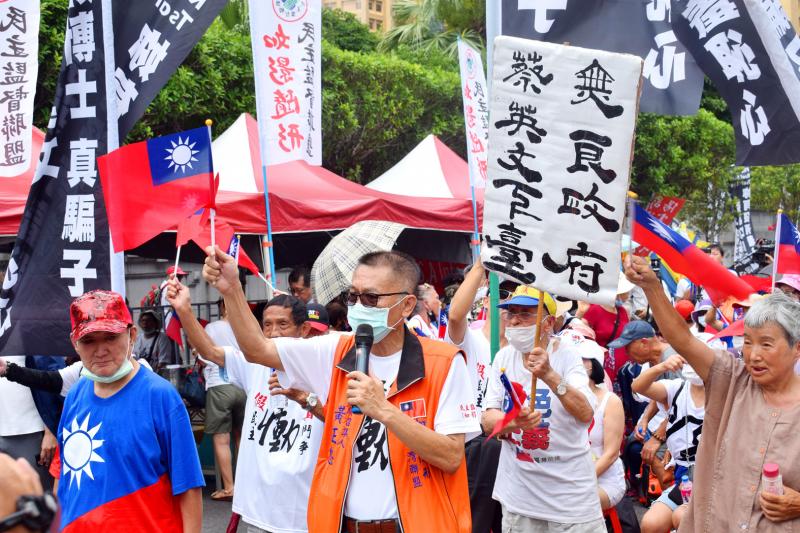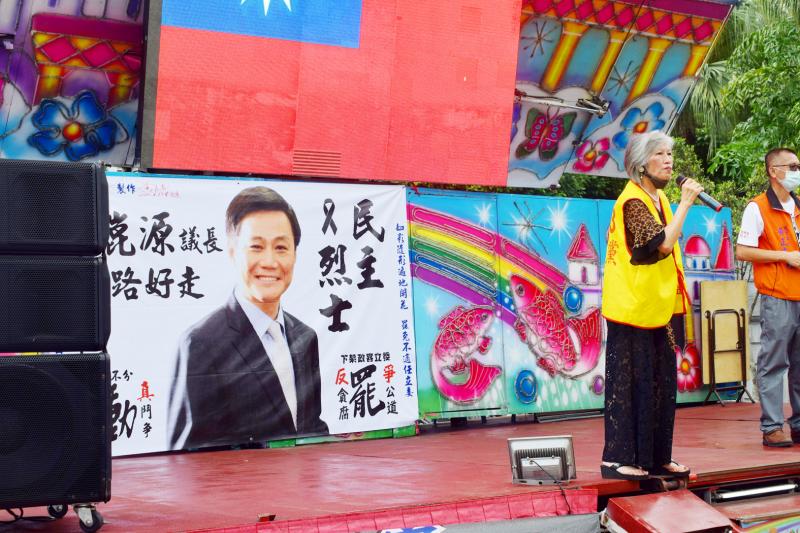Despite former Kaohsiung Mayor Han Kuo-yu (韓國瑜) of the Chinese Nationalist Party (KMT) encouraging his supporters to skip a rally held on Saturday to protest his recall, Jo Lee (李), 67, still flew to Taipei from Kinmen County to attend the event held in front of the Presidential Office.
As the rally began, Lee, a self-declared “Han-fan,” jostled to the front of the growing crowd. In one hand, she held a large umbrella, from which hung t-shirts displaying calls for “justice,” and in the other, a Republic of China flag.
“I wanted to listen to what Han said but…,” Lee said, pausing for several seconds. “We are really in pain.”

Photo: James Chater
Lee said that she was unable to sleep on June 6, the night that Han was successfully recalled; learning of the death of Kaohsiung City Council speaker Hsu Kun-yuan (許崑源), who was one of the mayor’s strongest supporters, only compounded her distress.
Like Lee, few of the estimated 500 people that attended Saturday’s rally were actually from Kaohsiung, and their frustrations were not solely directed at Han’s recall, a testament to the extent the event had diverged from its original purpose. Instead, they were using the protest to express their concerns over the state of Taiwanese politics.
The primary target was President Tsai Ing-wen (蔡英文) and her Democratic Progressive Party (DPP) administration. Those at the rally, mostly in their fifties and sixties, accused Tsai of electoral fraud and faking her PhD diploma, grounds attendees believed for the President to also be recalled.

Photo: James Chater
In this regard, much that was voiced simply re-hashed tropes critical of the DPP from the presidential campaign that ended on Jan. 11 with Tsai’s victory over Han. However, attendees, most of whom are in favor of unification, predictably expressed an acute dissatisfaction with the direction of the nation’s politics.
Sensitive to being too closely associated with China, and having run a recall campaign that criticized the vote as an unnecessary extension of the presidential election, Han’s reluctance to attend was unsurprising.
‘GONE OFF COURSE’
Lin Kuei-Hsiang (林桂香), 65, originally from Tainan, had just returned home from Hawaii for the Lunar New Year, when the coronavirus struck. Unable to leave since then, Lin said she slowly realized that Taiwan had “gone off course,” citing Han’s recall as evidence.
“Tsai can’t just use the power of the state to bring someone down if they don’t like them,” she said.
Lin said the recall was evidence that Taiwan’s democracy had been “distorted” — though the right to recall is enshrined in the constitution and it was launched not by Tsai, but by leaders of the WeCare Kaohsiung organization.
A sense of Taiwan’s “loss” or “deviation” permeated discussions with attendees. However, it most often arose when conversations touched on unification.
UNIFICATION
In this regard, the arrival of Chang An-le (張安樂), Chairman of the China Unification Promotion Party (中華統一促進黨) and a steadfast supporter of unification, provided a revealing litmus test.
Chang is a highly controversial figure. He has extensive historical connections with underground criminal organizations. After a warrant was issued for his arrest in 1996, he fled to China, but was arrested on his return in 2013, only to be released on bail.
Bobby Luo, 43, was chatting enthusiastically amongst friends when he noticed Chang’s entourage moving toward the platform. Unsure who it was at first, Luo walked across to check that it was indeed him. Returning to the group, Luo had a sudden expression of unease.
“He’s going to influence people’s perception of this event,” he said nervously.
However, Taipei resident Chung Chin (鐘琴) 66, described the appearance of Chang as “healthy” for Taiwanese society, which she says has become too sensitive to positions supportive of unification.
“There needs to be a public debate,” Chung said.
Chung criticized the education system, which she said downplays the nation’s historical links to China. With Han’s recall, she is also concerned about the growing taboo around positions supportive of unification.
And despite the conviction of the protesters, it was hard not to equate the sense of “loss” frequently mentioned with the loss of these ideas from the political mainstream.
Han’s refusal to attend, along with other heavyweight members of the KMT, pointed to the increasingly fringe position of views held by those at the rally. Young people were almost entirely absent, a stark contrast to the rally in support of Hong Kong, which was occurring simultaneously at Liberty Square a few hundred meters away.
Although the rally was small in scale, Lee from Kinmen remained optimistic that it would exert at least some kind of influence.
“The people here are like a small stone, when it is dropped into water, it creates a ripple,” she said.

Taiwan has next to no political engagement in Myanmar, either with the ruling military junta nor the dozens of armed groups who’ve in the last five years taken over around two-thirds of the nation’s territory in a sprawling, patchwork civil war. But early last month, the leader of one relatively minor Burmese revolutionary faction, General Nerdah Bomya, who is also an alleged war criminal, made a low key visit to Taipei, where he met with a member of President William Lai’s (賴清德) staff, a retired Taiwanese military official and several academics. “I feel like Taiwan is a good example of

March 2 to March 8 Gunfire rang out along the shore of the frontline island of Lieyu (烈嶼) on a foggy afternoon on March 7, 1987. By the time it was over, about 20 unarmed Vietnamese refugees — men, women, elderly and children — were dead. They were hastily buried, followed by decades of silence. Months later, opposition politicians and journalists tried to uncover what had happened, but conflicting accounts only deepened the confusion. One version suggested that government troops had mistakenly killed their own operatives attempting to return home from Vietnam. The military maintained that the

Jacques Poissant’s suffering stopped the day he asked his daughter if it would be “cowardly to ask to be helped to die.” The retired Canadian insurance adviser was 93, and “was wasting away” after a long battle with prostate cancer. “He no longer had any zest for life,” Josee Poissant said. Last year her mother made the same choice at 96 when she realized she would not be getting out of hospital. She died surrounded by her children and their partners listening to the music she loved. “She was at peace. She sang until she went to sleep.” Josee Poissant remembers it as a beautiful

Before the last section of the round-the-island railway was electrified, one old blue train still chugged back and forth between Pingtung County’s Fangliao (枋寮) and Taitung (台東) stations once a day. It was so slow, was so hot (it had no air conditioning) and covered such a short distance, that the low fare still failed to attract many riders. This relic of the past was finally retired when the South Link Line was fully electrified on Dec. 23, 2020. A wave of nostalgia surrounded the termination of the Ordinary Train service, as these train carriages had been in use for decades